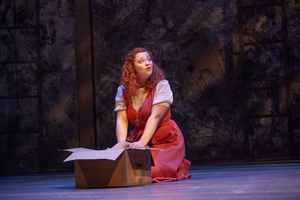Review: THE CAUCASIAN CHALK CIRCLE, Rose Theatre
Christopher Hayden's production feels too much like hard work

![]() The story of a land dispute between two rival groups in Eastern Europe, a 'special military operation' and a refugee crisis. No, not the current news headlines, but the contents of Bertolt Brecht's 1948 play The Caucasian Chalk Circle, revived by a major London theatre for the first time in twenty five years. Unfortunately, Christopher Hayden's re-imagined production feels too much like hard work.
The story of a land dispute between two rival groups in Eastern Europe, a 'special military operation' and a refugee crisis. No, not the current news headlines, but the contents of Bertolt Brecht's 1948 play The Caucasian Chalk Circle, revived by a major London theatre for the first time in twenty five years. Unfortunately, Christopher Hayden's re-imagined production feels too much like hard work.
Set in the middle of a revolution, we follow the story of a poor servant girl, Grusha, who risks her life to save the baby of a noble family, enduring a loveless marriage and a battle with the self-serving mother of the baby, to keep the child safe.
At its heart the play is a parable, concerning the struggle of two women over the custody of a child. Unlike many of his plays, The Caucasian Chalk Circle has a relatively happy ending.
Carrie Hope Fletcher is a canny bit of casting who will draw in audiences who would otherwise never go to see a Brecht play. Her vocal abilities are never in doubt, but she is also a convincing and charismatic Grusha.
Jonathan Singer is the standout, bringing a welcome comedic slant as a suitably self-serving Azdak. He has impeccable timing and a droll, sneering delivery that really engages the drooping audience after the interval. Nickcolia King-N'Da is naturally likable as Simon, Zoe West is engaging, but overworked as The Singer.
Songs are intrinsic to Brecht's original play and composer Michael Henry has created some interesting interpretations. The whole cast provides the background percussion, with just an occasional guitar to accompany the singing. The effect is impressively performed, but is also very repetitive at times. Fletcher is, unsurprisingly, the standout, but her impressive voice is not used as much as it could be.
By definition, Brecht's epic theatre is not meant to do something as frivolous as entertain. He uses drama as a social and ideological forum for left-leaning causes; an inspiration to action, highlighting the individual's greater responsibility to the collective good, and making audiences think. His plays are an active, rather than passive experience.
Director Christopher Haydon has made the decision to actively ignore these theories, at least in the first half of the production. Bringing the prologue into a modern day refugee camp is a very relevant idea and works well. A singer, brought in to the provide entertainment, sets up the refugees to act out the play-within-a-play and so the story begins. He also ramps up the stories with slapstick and villains that are almost pantomime-esque.
After the interval, the fourth wall is finally broken and the audience is invited to think about what is happening, rather than just watching it. At three hours, the production becomes a slog as hard as Grusha's trek through the mountains and a judicious amount of trimming would be welcome.
This is a busy production, with lots often happening at once. The cast is deft and precise, but there are some strange staging decisions such as an odd ice-skating motion used to illustrate walking and running. There are also too many accents used to count. Many fall into the usual cliché of RP being used by the snobbish and morally questionable, to regional yokel accents used by those who live in the countryside. It seems a lazy trope to use.
Brecht is often a hard writer to enjoy, but this energetic cast give a huge amount to the production. However, for this reviewer, there are too many things that don't quite work, although I'm sure that Carrie Hope Fletcher's legions of fans won't even notice.
The Caucasian Chalk Circle is at the Rose Theatre until 22 October
Photo Credit: Iona Firouzabadi
Reader Reviews
Videos

